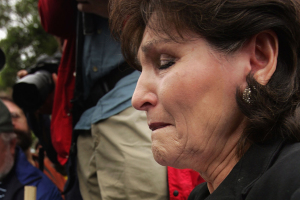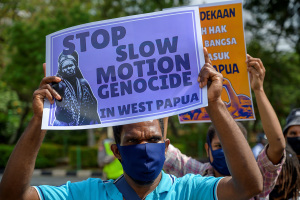Hope Unlimited Co-Founder on Family-Style Raising of Brazilian Street Kids
The father-son team of the Rev. Jack Smith and son Philip Smith along with David Swoap, the former deputy secretary of the U.S. Department of Health and Human Services, founded Hope Unlimited in 1992. The ministry has reached more than a thousand Brazilian street children – many on drugs or engaged in prostitution prior to their participation in the ministry.
Co-founder/president Philip Smith spoke to The Christian Post on Thursday about the unique family-style raising of the children and the ministry’s future goals as it looks forward to its 15th anniversary.
CP: How is the ministry Hope Enterprises in Ethiopia connected to Hope Unlimited in Brazil?
Smith: Hope Enterprises is not so much connected to Hope Unlimited in Brazil except that it shares the same founder – Jack Smith. The founding vision for both was to start a local ministry to street kids that would be turned over to members of the local community so that it would be an indigenous ministry.
In Ethiopia, this little thing started in our backyard and it was turned over in 1977. It now provides services to 8,000 people and on Dec. 2 they just inaugurated the new Hope University.
In Brazil, the vision has been the same. I have been the only American there since the beginning and I even spend half my time in the states supporting the ministry. Brazilians are now developing it and they are raising half their support and all the administration is done through the local staff and board.
CP: Did you help establish Hope Enterprises with your father also?
Smith: I would like to take responsibility for Hope Enterprises, but I was only six or seven-years-old at the time.
My parents left as Presbyterian missionaries in 1959 and my mom was 7 months pregnant when they finally got their visas for Ethiopia, so my older sister was born only three weeks after they arrived. I was also born in Ethiopia and Hope Enterprises started in a little tool shed in our backyard in 1971.
My parents would see these little street kids as they went back and forth during their missionary assignment as teachers at a school.
Mother Teresa was a colleague of my father and would go to Ethiopia quite frequently and challenged him to take in the older kids from her orphanages and stories like that came together. We left with 300 kids in a huge facility founded by the Dutch government in 1977 and like I said that has grown to 8,000.
CP: Are there many Christian mission groups working in Brazil and doing the same activities as Hope Unlimited?
Smith: There are many folks that have an interest in working with these street kids and there are a lot of missionaries working with the kids in the streets. I do not know of any large scale programs that are providing residential care and vocational training for street kids.
I express that clearly as a challenge because we would love to find out those whom we could come alongside and learn from.
CP: Is it hard working with street children, especially from another culture?
Smith: It is enormously difficult. Probably the street children in Brazil would be more like children in the United State in terms of their hardness. The more developed cultures just make different characteristics come forward.
In Ethiopia, because it is very much a developing society where family is so highly valued, in times of starvation the family would die and give the children the last morsel of food and the children actually grew up with hope. Sometimes that hope was the only thing that kept them alive.
In Brazil, we sometimes see children dying simply because they don’t have hope. They lost hope because of abuse, the father abandoning the family, and the mother turning to prostitution and all those kind of factors.
So it is enormously difficult to work with these children. When we started our first year we brought in our first group of 35 kids and every one of them ran away. That has been the experience of many people who have tried to work with these kids. That is why frankly you don’t have more groups working with them.
CP: Do these children have a hard time accepting love?
Smith: The name of our training manual that we use is called When Love is Not Enough. It is not intuitive. We think about how do we tell these children about the concept of a Heavenly Father when they have no idea what the love of a father is all about. For them the father figure is that drunken guy who stumbles across the room towards their bed at 2 o’clock in the morning. They think if this is what my earthly father does then I don’t even want to know about this great, powerful Heavenly Father.
CP: How has this ministry helped spread the Gospel in Brazil?
Smith: I think the most powerful thing is through the testimonies. There has been a lot of competition in the past between the Catholics and Protestants. The Catholic notion has been that they are saved by work and the Protestants were showing that they were saved by grace and didn’t have to do anything.
To everybody, even the Protestant community, we have been trying to show the full expression of wearing the mantle of Jesus Christ is being compassionate and reaching out in social ministry.
There other thing is that Christianity has been relegated to members of the lower class and the upper class is very much an unreached group. One reason is when they go to church they have to share the pews with folks from the lower class and that is not an easy thing traditionally for people in Brazil because there is such segregation between the classes.
So I think having – especially when the Americans come down – educated, sophisticated people who are giving their time and making sacrifices for these children has made a powerful impact.
We received some awards in Brazil – the social project of the decade – and that is wonderful because they help bring recognition and help more people ask what is the key to your success and that gives us a chance to share.
CP: Do the children in the program receive Bible study? Are they ministered to when they are part of Hope Unlimited?
Smith: It is definitely a ministry because they come into our family and we raise them as I was raise in my family. We created a different culture for them. Many people have criticized us because of our Christian orientation, like certain rights group and even foundations that would support us.
I said, “Well any parent would raise their children in conformance with their own faith pattern.” If you were a Buddhist family I would not anticipate you not taking their children to the temple. I come from a Christian family and my children are going to come to church with me and worship with me just as I did with my parents and it works towards their stability.
And because they don’t have one parent but a group of parent everyone has to be on the same page. So we have to all work as one mom and dad and that is why we have to give them the same message.
People actually get it – it’s like the light goes on and it’s been amazing that we received support and major financing when we are able to present it in that way.
CP: What have you learned personally through working with these street children?
Smith: Many things. One thing I learned early on was the love of the Heavenly Father. I realized as we grew from having five kids to ten kids to 30 kids, that your ability to love was not diminished when it spreads out. It is like you have a pot of love and if you spread it out among more members it is going to grow smaller for each one. But it seemed like as we added more kids my love for each one increased even more. Well, if that’s the example then how much more must God love us. It taught me initially about love – the more people you love the greater is your capacity to love.
CP: What goal do you have for the future as Hope Unlimited celebrates its 15th anniversary this year?
Smith: Well, we received many requests from folks working with these street kids from all over the world, especially in Brazil. They ask, “How do you get success? Our kids are running away from the program and going back to drugs.”
We recently received some requests from some foundations to finance us so we can put our expertise and our experience on paper to develop training material. We will be able to come alongside other folks who are working with these kids around the country and help train them and certify them to get better results with these kids.
A lot of it is from our own experience working with these kids, but a lot of it is just us going out and finding the best methodologies that are out there and bringing them together.
The vision for the future is instead of us growing out and building more facilities, we would like to be coming alongside others. We have even received a request to come alongside the folks from the juvenile detention authorities to help them develop techniques that will reach the children more effectively.
CP: What would you say is the most effective tool in helping these children?
Smith: You have to get their respect. The kids - because of their insecurity growing up when no one cared for them when they cried out as babies – believe that they need to be control. So their characteristics are actually control techniques: from mumbling, to lying, to grabbing onto your hands and jumping up and hugging you pulling your neck down.
You think it is sweet so you don’t want to criticize these kids for tugging on your hands because, “oh they’re victims.” But that doesn’t help them because these are actually control techniques. The kids cannot trust and unless they can trust somebody they are not going to turn over control to them. You have to get their respect and establish yourself in a position of being stronger than them so they will begin to trust you and relax and then you are in the position to help them.
If you let these kids treat you like a doormat and they are underneath you, then our example says that makes them the dirt underneath the doormat. How will they have self-esteem that way? For them to have self-esteem, to be princesses and princes, you need to be the kings and queens.
The exciting thing is these psychological therapeutic techniques are no more than what we learn in the Bible about parenting. It is just biblical, Godly parenting.
CP: Is there anything you want to add?
Smith: In a country with a small population of extreme wealth and a huge population of extreme poverty, the children are the losers. There are 7 million of them on the Brazilian streets that are in gangs, forced prostitution, stealing, begging and on drugs.
When you think about those children, you think about the enormous task we have. We really want people to be remembering these children, to be praying for them, but instead of praying for 7 million, bring it down and put a face on it and think about one of them. Think of your own child in that situation.
We are currently helping 600 of these kids. We have graduated 300, place back with their families 500, and then we have a number of children that have come and run away. But we planted seeds in them and many of them have come back years later completely transformed, and that doesn’t get into our formal statistics. But well over a thousand Brazilian street children have really received some transformational help.




























